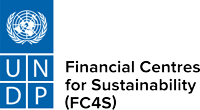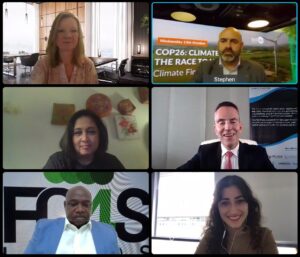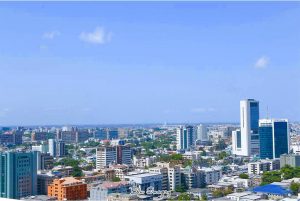Coincides with launch of the Chinese version of the UNDP-FC4S ‘2021 State of Play Assessment Report’
April 22nd 2022: As part of World Earth Day 2022, the Shenzhen Green Finance Committee have today held a seminar in Shenzhen to help promote the launch of the Chinese version of the United Nations Development Programme – Financial Centres for Sustainability Network (UNDP-FC4S), ‘2021 State of Play Assessment Report’.
Centred around the theme of ‘Promoting sustainable finance and jointly investing in protecting the planet’, the event was sponsored by the Shenzhen Green Finance Committee, supported by the UNDP-FC4S, and hosted by the China Emissions Exchange (Shenzhen), in association with the Shenzhen Exchange Group.
Thousands of people tuned in to watch today’s live stream.
Speaking at the event, Deputy President of Shenzhen Central Sub-branch of the People’s Bank of China, Mr. Chen Yuanfu, introduced the practice and beneficial attempts by Shenzhen to promote the development of green finance in an in-depth manner. He pointed out that this event is a further deepening of Shenzhen’s green finance international cooperation. He hoped that Shenzhen Green Finance Committee, as a platform and window for green finance international cooperation, will continue to work closely with FC4S to explore and improve the system and mechanism of sustainable investment, as well as to promote green finance capabilities and green finance business innovation. All of these efforts will enable Shenzhen to give full play to the advantages as an FC4S member, and contribute Shenzhen’s wisdom and strength to global green and low-carbon development.
Managing Director of FC4S, Mr. Stephen Nolan, introduced the network and said that it would continue to highlight Shenzhen’s green finance reform and innovation agenda, while actively promoting Shenzhen as a “pioneer of sustainable development” at home and abroad.
In his speech, Director of China Green Finance Committee and Advisor to Shenzhen Green Finance Committee, Dr. Ma Jun, paid tribute to Shenzhen’s innovative and leading work in the area of green finance. As the Co-Chair of the G20 Sustainable Finance Study Group, Dr. Ma Jun introduced discussions around transition finance framework at G20 level in the context of the G20 Sustainable Finance Roadmap. Dr. Ma Jun suggested that the availability of financing for helping traditional enterprises transition from high-emission to low-carbon should be increased, and the cost of financing capital reduced, in order to successfully achieve transition finance goals.
Following FC4S’ release of the ‘2021 State of Play Report’ in March of this year, the China Emissions Exchange (Shenzhen) as the Secretariat of the Shenzhen Green Finance Committee, translated the report into Chinese with the support of FC4S.
Deputy General Manager of the China Emissions Exchange (Shenzhen), Ms. Lin Yin, launched the publication on behalf of FC4S, the Shenzhen Green Finance Committee and the China Emissions Exchange (Shenzhen). Speaking at today’s event Ms. Lin provided an overview of the effectiveness of Shenzhen’s green and sustainable finance development.
The ‘2021 State of Play Report’ offers an analysis of 29 financial centers across the world, tracking their progress in supporting the sustainability agenda and identifying potential pathways and strategies. The report also promotes international connectivity and provides pertinent suggestions on sustainable finance development.
Bank of China Shenzhen Branch shared its experience responding to the requirements of the head office of the People’s Bank of China on promoting environmental information disclosure of financial institutions and introduced the 2021 Environmental Information Disclosure Report, which was released on the 18th April. This is the first environmental information disclosure report published by large State-Owned Commercial Banks in Shenzhen in accordance with the People’s Bank Of China Guidelines for Environmental Information Disclosure of Financial Institutions.
Industrial Bank Shenzhen Branch shared its “1 + 2 + 3” strategy in the marketing of carbon emission reduction financing, which is a set of mechanisms, two modes, and three work programs, and discussed practical examples of the strategy.
During the Dialogue session, panelists from regulatory bodies, international organizations and market institutions discussed the mechanism and practice of transition finance.
In her concluding address, the Head of FC4S Asia, Ms. Kelly Yu, highlighted the prospect of continuing cooperation between FC4S and the Shenzhen Green Finance Committee. She mentioned that both bodies had established a regular exchange mechanism and would jointly promote capacity building and international cooperation activities.
Today’s event was moderated by Liu Yang, General Manager of China Emissions Exchange (Shenzhen). Invited guests participating the event included Wu Jiang, Chairman of China Emissions Exchange (Shenzhen), senior representatives from local financial regulatory bureau and offices, as well as member institutions from the Shenzhen Green Finance Committee, financial professionals and academic experts.
In 2022, the Shenzhen-Green Finance Committee will further deepen the research on transition finance, explore the orderly and effective connection between green finance and transition finance, promote financial institutions to improve the ability and level of green financial services to the real economy, and help Shenzhen to play a pilot demonstration role and international exchanges and cooperation, explore the mode and accumulate experience for the development of green finance in China.
For further information regarding today’s event or FC4S please contact Kelly Yu (0086 13601169043) or by mailing xwykelly@yahoo.com.
Notes for editors:
Since China’s economy entered the stage of high-quality development, it has become the mainstream of financial work to promote high-quality development with new development concepts. China has carried out and been a world leader in the practice of green finance. Shenzhen Green Finance Committee and FC4S were both established in 2017. Under the guidance of Shenzhen People’s Bank, Shenzhen Green Finance Committee is positioned as a research think tank, a platform for deliberation, coordination and communication, and a window for international cooperation and exchange in the field of green finance, and has made numerous achievements in promoting the development of green finance in Shenzhen. Hosted by the United Nations Development Program, FC4S currently has 39 members, including world-renowned financial centers such as Tokyo, Paris, and Toronto, to share experiences in promoting green and sustainable finance development. Shenzhen Green Finance Committee joined the FC4S network on behalf of Shenzhen and became a founding member, which promoted the establishment of the Green Finance Supporting Real Economy Laboratory in Shenzhen. Among the FC4S membership, 12 are based in Asia with 4 in China, including Beijing, Shanghai and Hong Kong.












































